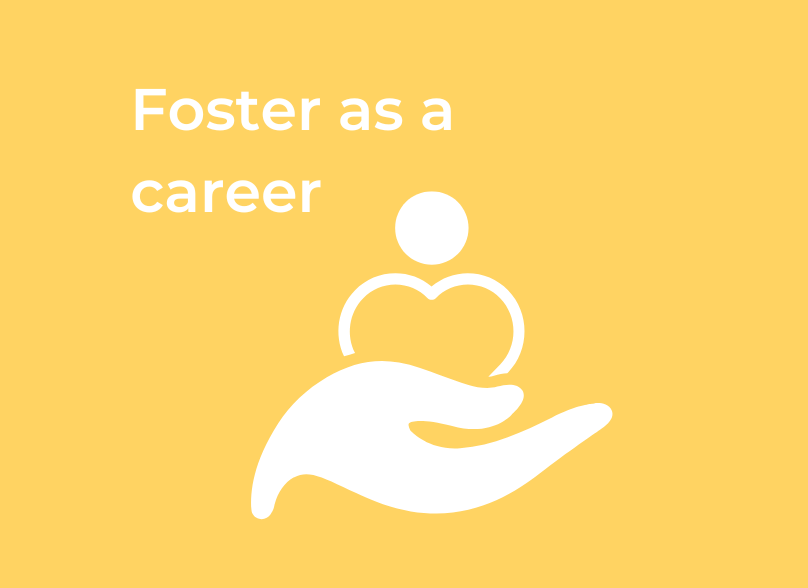A career in fostering by foster carer, Daisy Doo*
''We began our journey with Calon Cymru, and are now supported, 24/7, valued and matched perfectly to the young people that come to share our home.''
Read moreYou will provide life-changing support to vulnerable children if you pursue a fostering career. It's a rewarding job with a real impact - your efforts will make a difference.



Fostering is a demanding and rewarding career that requires excellent empathy, patience, and dedication. The following are some qualities that may make someone suitable for a job in fostering...
The primary goal of fostering is to provide a safe and stable home environment for children who have experienced abuse, neglect, or other forms of trauma. Fostering can be challenging, but it can also be enriching when you see the positive impact you can have on a child or young person's life.
Fostering is a collaborative effort that involves working with social workers, therapists, educators, and other professionals to meet the child's needs. Fostering requires a solid ability to communicate and collaborate effectively with others.
Fostering can be unpredictable, and carers must adapt to changing circumstances and be flexible. In addition, children in care may have different needs, so adjusting and providing the appropriate support is crucial.
Fostering can be emotionally challenging, and carers must remain patient and resilient when facing difficult situations. Children in care may display challenging behaviour, and carers need to be able to respond with empathy and understanding.
Fostering requires providing a stable and nurturing home environment that is safe and secure for children. In addition, carers must be able to provide a positive role model and offer guidance, support, and care to the children in their care.
Fostering is a rewarding but challenging career that requires a range of personal qualities and professional skills. If you are passionate about making a positive difference in a child's life and possessing these qualities, contact us today. We would love to hear from you.
Our foster carers have a number of life skills that help them to provide a safe and stable home for their foster children. Some of the essential life skills for foster care include:
Foster carers need to communicate effectively with children, young people, and their families, as well as with social workers, teachers, and healthcare professionals.
Foster carers need to be able to deal with challenging behaviours and situations and remain calm and patient under pressure.
Foster carers need to be flexible and adaptable to changing circumstances, including accommodating the needs of different children and young people.
Foster carers need to understand and empathise with the experiences and emotions of children and young people.
Foster carers must manage their time effectively, keep accurate records, and maintain a safe and organised home environment.
Foster carers need to be able to advocate for the needs and rights of the children and young people in their care, including working with social workers and other professionals to ensure that they receive appropriate support and services.
Foster carers need to be able to appreciate and respect the cultural backgrounds and traditions of the children and young people in their care, including their religious beliefs, dietary requirements, and family customs.
Foster carers must work collaboratively with other professionals, including social workers, teachers, and healthcare providers, to ensure the best possible outcomes for the children and young people in their care.
Foster carers can come from very different backgrounds, bringing a range of life experiences, but they all share a common goal of providing a safe and stable home environment for children and young people who cannot live with their birth families.
In general, to become a foster carer, you must:
Be at least 21
Be in good health, physically and emotionally, to provide adequate care for children.
Have a spare bedroom in your home that is suitable for a child or young person to sleep in.
Demonstrate that you have the time, patience, and commitment to care for a child or young person.
Be willing to undergo background checks, including criminal record checks and a check on your ability to work with children.
Attend training sessions and undergo an assessment process to determine your suitability to be a foster carer.
Have a stable home environment and provide a safe and nurturing environment for children and young people.
Here at Calon Cymru Fostering, we will be with you every step of the way. We will support you and give you all the tools you need to become the fantastic foster carer you are achieving to be.
Yes, your professional background may give you a unique perspective and set of skills that could benefit a foster child who may have experienced trauma or has behavioural health needs.
Your profession may give you valuable skills and experience that make you a great foster carer, such as medical knowledge and experience caring for others.
Yes, military families can make great foster parents because they often have a strong sense of duty and are used to adapting to change and overcoming challenges.
Your teaching profession may give you valuable skills and experience that make you a great foster parent, such as patience, communication skills, and experience working with children and youth.
Your experience caring for others may give you valuable skills and insights that could make you a great foster carer.
Regardless of your existing career and work experience, you will have many transferable skills and our training and development programme will give you the confidence to proceed alongside our supervision and support.

''We began our journey with Calon Cymru, and are now supported, 24/7, valued and matched perfectly to the young people that come to share our home.''
Read moreGet in touch today for a casual, friendly chat with our experienced foster advisors.
Contact us
